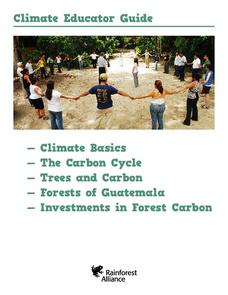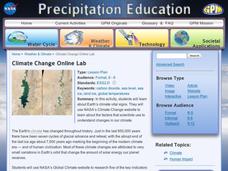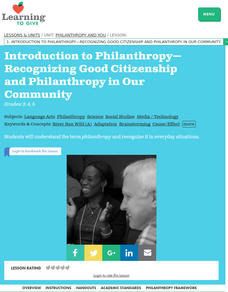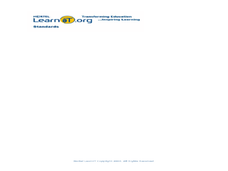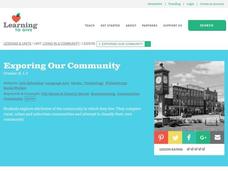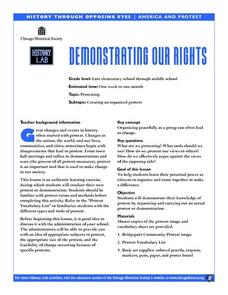Library of Congress
Investigating the Building Blocks of Our Community’s Past, Present, and Future
As Ken Jennings said, "There's just something hypnotic about maps." Certainly, the longer you look at them the more you can learn. In this project-based learning lesson, individuals study both historic and present-day maps of...
Wild BC
Is Climate Change Good for Us?
Is it really that big of a deal if the global climate undergoes a little change? Young environmentalists consider this very question as they discuss in small groups the impact of different climate change scenarios on their lives,...
Curated OER
Our community-in sculpture form
Learners design tiles that represent their community. They discuss ideas with another class through email. They then create the tiles, fire them, and attach them to a masonite board to create a community mural.
Rainforest Alliance
Climate Educator Guide
Climate change is a hot topic in the news. Class members examine carbon dioxide data to analyze trends of our atmospheric makeup over time. They also discuss climate and climate change, and determine how these changes are affecting life...
NASA
Climate Change Online Lab
What are the key indicators that show scientists that our planet is in the fastest warming trend ever? Learners go on a WebQuest to examine the evidence for themselves. Following several links to NASA sites, kids see how the global...
Teaching Tolerance
Changing Demographics: What Can We Do to Promote Respect?
America has always been seen as a melting pot to the world. Scholars research the concept of blending cultures in the United States and how it is changing over time. The final lesson of a four-part series analyzes the changing...
iCivics
Students, Engage!
Discuss as a class some problems that you would like to see changed in your school or community, and then take action! After your young citizens determine the appropriate steps they should take to accomplish their objectives, they will...
Curated OER
Introduction to Philanthropy-Recognizing Good Citizenship and Philanthropy in Our Community
Students explore the term philanthropy and recognize it in everyday situations. They list three philanthropic activities occurring in their own home, in their classroom, or in their school. Students identify at least one act they might...
Virginia Department of Education
Changes in Ecosystems
How does water pollution affect the environment? Provide your class with the resources to answer this question as they learn about eutrophication and ecosystem changes. Over two weeks, they simulate the effects of pollution on the...
Curated OER
Working Together to Improve Our Community
Students from the fourth grade research a solution to a community problem and converse with eighth graders via email. Eighth graders study the political process and work with the fourth graders to present information to the public to...
Curated OER
A Generation that Cares: Saving our Environment!
Students discover the dangers posing our environment. In this environmental awareness lesson plan, students investigate problems like global warming and pollution and discuss ways their generation can solve these issues....
Curated OER
Living in a Community
Students understand the differences in communities by reading "City Mouse, Country Mouse" by Isabelle Chantellard. In this types of communities instructional activity, students find that although communities are different, one is not...
Learning for Justice
Change Agents in Our Own Lives
Everyone has the power to change their own lives. Young historians learn how they can become agents for change in their own lives and the community. The lesson focuses on positive role models and what motivates individuals to promote...
Polar Bears International
Taking Action!
Motivate young scientists to stand up and take action with this environmental science lesson. To begin, the class works in small groups brainstorming actions that support the conservation of the earth before creating and implementing an...
Curated OER
Introduction to Urban & Community Forestry: Why Do We Need Trees?
Twelfth graders construct a timeline to show changes and trends in the future of urban and community forestry. In this forestry lesson, 12th graders discuss the importance of trees. They read a timeline and add future events to show...
Curated OER
Take a Walk in Their Shoes: Great Leaders of Our Time
Research the characteristics of leaders who have used nonviolence to change society. The class then applies this information to their own community to find leaders with these same characteristics, creating a wall collage of pictures and...
Curated OER
Demonstrating Our Rights
Students view image of Bridgeport Community Protest, discuss event depicted in image, and demonstrate knowledge of protest by organizing and carrying out an actual protest or demonstration.
Curated OER
How Can Clear of Tress Destroy a Community?
Fifth graders brainstorm the relationship between trees and humans to determine how humans benefit from trees and how they benefit from us. They discuss oxygen/carbon dioxide exchange, soil stablization, animal habitat, shade, medicine...
Curated OER
Our Changing Community
Young scholars investigate how communities grow and change. In this communities lesson, students discuss how their community has changed and construct a model of a community.
Curated OER
Community Problem Solving
Learners use community problem solving to solve a littering problem in the community of San Carlos. Students use a Role Play Description to learn this process.
Curated OER
A Community of Givers
Students explore charitable organizations. In this character development lesson, students read about children who have contributed to charitable organizations, research a variety of these organizations, plan a project, and prepare a...
Rainforest Alliance
Who Takes Care of the Maya Forest Corridor?
Who keeps animals safe? Who keeps us safe? Discover the helpers that make learning and growing possible through a medley of activities that focus on habitats—ours and those in the rainforest. Scholars are asked to identify one...
National Wildlife Federation
Master P in the House: An All School Energy and Climate Change Plan
A person in the US uses 20 times more energy than a person in India—that's a drastic difference! The final lesson in the 12-part series goes back to the initial energy audits, analyzes which room showed the most conservation of energy,...
Polar Trec
Why Can’t I Eat This Fish?
Can turning on the television lead to toxins in the food supply? The lesson offers an opportunity for young scientists to complete guided research. A worksheet lists each question as well as the web page necessary to answer the question....



